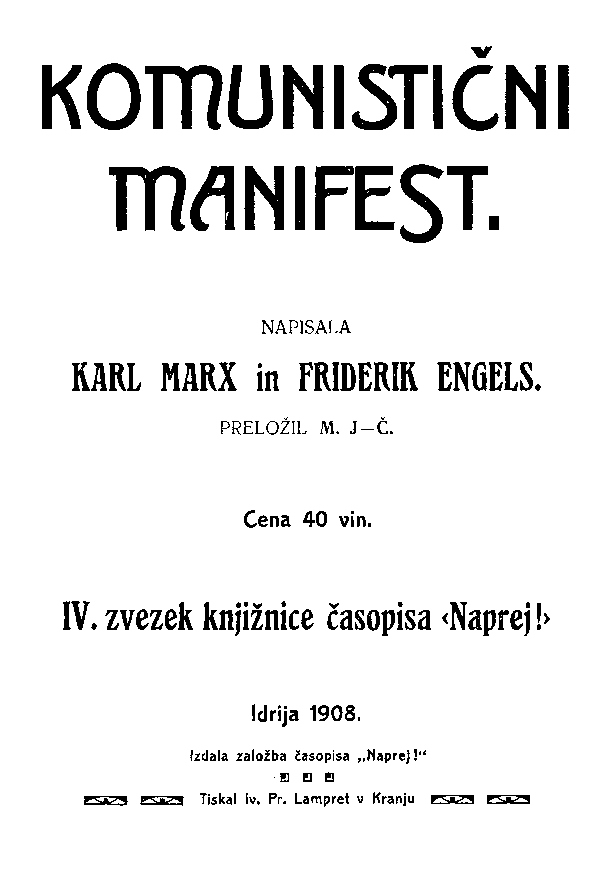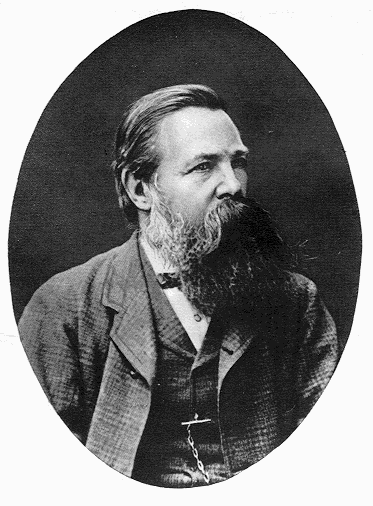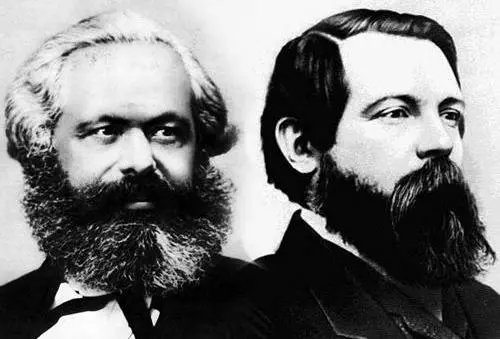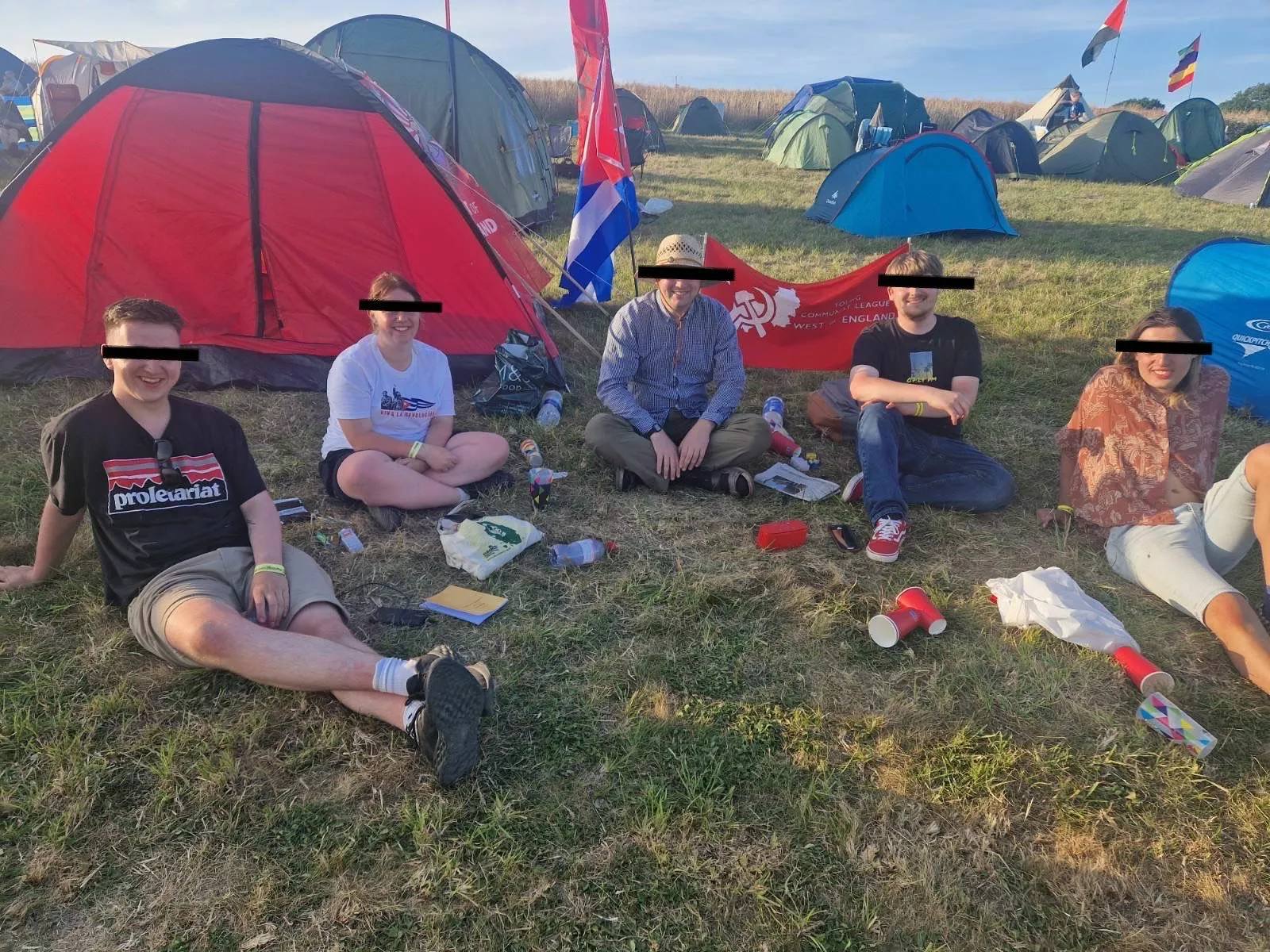Frederich Engels (1820-1895) and his close and dearest friend Karl Marx (1818-1883)dedicated their lives to prepare the working class for its revolutionary future. As Vladimir Lenin put it, the two “taught the working class to know itself and be conscious of itself, and they substituted science for dreams.” In Engels and Marx’s formative years, the newly forming industrial and urban working class faced dramatic and unprecedented challenges – choosing sides in wars, impoverishment, long working days and, not least, securing for itself an independent and conscious role in humanity’s affairs. Marx and Engels met that challenge and in the process made a world-historic advance in philosophy and political strategy, birthing what is known today as Marxism, or the ideology of the revolutionary working class.
When Marx and Engels developed their theory – maturely expressed in their Manifesto of the Communist Party (1848) – socialism was largely viewed as a world-view of well intentioned individuals, not as among the most important of the proletariat’s demands requiring political state power (class dictatorship) over the deposed capitalist and landowning classes.
The proletariat in 1848 had little experience in the struggle for political power. Socialist revolution was not impending, inevitable and urgently required as it is in modern times. Before Marx and Engels, movements to emancipate working people were guided by immediate demands and borrowings from moral writings, like those found in early Christianity. The conditions of working class struggle changed radically soon after Engels’ death, when monopoly capitalism replaced pre-monopoly or competitive capitalism.
Within a decade of his death, Marxism was the ideological force behind all meaningful socialist and working class advance, from the Russian Socialist Revolution (1917) and the end of two world wars (1918 and 1945) to the Cuban socialist revolution (1959), the formal (but not yet economic) independence of Europe’s former colonies, and much of our modern shorter work week.
Engels and Marx authored the foundation of Marxism’s theoretical and practical components, including an honest and scientificpolitical economy of capitalism, the philosophy of dialectics and materialism in thought and nature, and the strategy, tactics and aims of the revolutionary socialist proletariat. They revealed the needed aids and avoidable pitfalls on the road to socialism.
Lenin concisely expressed their contribution:
“Marx and Engels were the first to explain that socialism is not the invention of dreamers, but the final aim and necessary result of the development of the productive forces in modern society. All recorded history hitherto has been a history of class struggle, of the succession of the rule and victory of certain social classes over others. And this will continue until the foundations of class struggle and of class domination – private property and anarchic social production – disappear. The interests of the proletariat demand the destruction of these foundations, and therefore the conscious class struggle of the organised workers must be directed against them. And every class struggle is a political struggle.”

As late as 1892 Engels wrote, “It seems a law of historical development that the bourgeoisie can in no European country get hold of political power – at least for any length of time – in the same exclusive way in which the feudal aristocracy kept hold of it during the Middle Ages.”
Marx and Engels lived through great turmoil,practical and intellectual revolutionary struggle, and necessary retreats.
A few months after publishing the Manifesto, they jumped into the fray of the German revolution of 1848 to 1849 as publishers of the NeueRheinischeZeitung – an Organ of Democracy,” the first daily newspaper of the revolutionary proletariat.
Marx founded the paper to fight for a democratic line which, Engels noted, “emphasized the specifically proletarian character in everything.”
In a letter to Marx about fundraising for the newspaper, Engels wrote “the thing is the radical bourgeois here also see in us their future arch-enemy and have no desire to put weapons in our hands that we would soon turn against them.”
Engels and Marx were well aware they probably would not experience the great revolutionary battles of the future. (Marx wrote to Engels that “if nature is kind to us” they might see the battles, which proved not to be the case.)
And yet they left a bountiful legacy as pioneers of proletarian strategy, like the example of the struggle for democracy in 1848 as a necessary step before any serious battle for socialism, a teaching Lenin and the Russian Marxists upheld with world-historic success.
In 1916 Lenin summarized this thought as follows:
“Socialism is impossible without democracy in two respects, 1. The proletariat cannot carry out a socialist revolution unless it has prepared for it by a struggle for democracy; 2. Victorious socialism cannot maintain its victory and bring humanity to the time when the state will wither away unless democracy is fully achieved.”

The Manifesto sets no limits on how to conceive democracy which is natural since without the abolition of all forms of discrimination and oppression like war, private education and private health care – without this abolition democracy will continue to be deceptively limited to parliamentary elections.
Marx and Engels espoused the view that democracy must have a far broader meaning than voting every few years. Conceived this way, the proletarian democratic struggle consists in everything that leads to the abolition of classes that leads to the future society where the working class is the human race.
The notion of continuing a revolutionary struggle for socialism after “winning the battle of democracy” (quoting theManifesto)was only one of Marx and Engels’ contributions to proletarian strategy. They also advocatedlinking the immediate tasks of the working class movement with its end aim of socialism, combining working class and peasant struggles, the international solidarity and friendship of workers, alliances between working class and small capitalist parties (however temporary) and the need to allow for the peculiarities of different countries.
Importantly, they did not tie the hands of future revolutionary forces in the kinds of alliances, positions or compromises they would have to contemplate for a successful advance or retreat. After Engels’ death in 1895, the world labour movement fell under the influence of opportunist leaders of the Second International (an alliance of workers’ parties) who replaced Marxist ideas with illusions of their own, replacing proletarian strategy with parliamentary election campaigns. These misleaders practiced unprincipled submission to the bourgeoisie, like backing “their” national capitalists with votes in European parliaments during the imperialist First World War. They deceived workers with revolutionary phrases.
The strategic and tactical ideas of Marx and Engels were only kept alive by Lenin and other Marxists who led the Russian Socialist Revolution which is still the most serious blow ever suffered by global capitalism.
But years earlier, Engels realized that the Prussian army was “a more infamous tool of reaction than ever before.” In 1884 he proposed a policy to undermine the spirit of submissiveness in the Prussian regiments who were drawn mainly from the heavily oppressed mass of rural laborers.
Engels proposal was very much related to the war danger and concerned the correct combination of a proletarian party’s immediate and long term aims. He wanted the proletarian parliamentary caucus to submit a draft Law to lease Crown lands to cooperatives of rural labourers for common cultivation. The party leaders failed to understand Engels’ line of thoughtand did not take up his suggestion, although the proposal launched a long controversy over the party’s agrarian policy. Bebel, one of the leaders, replied it would be a waste of time because the government would not consider such a law.
Engels agreed that the party should make only practicable suggestions, but “objectively practicable, not necessarily practicable for the present government. I go further, when we suggest socialist measures calculated to lead to the overthrow of capitalist production (like this one), then only measures which are objectively practicable but impossible for this government....This proposal will not be carried out by any Junker or bourgeois government. To show the rural proletariat of the eastern provinces, the way to end Junker and tenant exploitation; to put the means to do this into their hands; to set in motion the very people whose enslavement and stultification produces the regiments which are the foundation of Prussia; in short, to destroy Prussia from within at the root – they certainly wouldn't do that. It is a proposal which we must take up under all circumstances as long as the large estates exist....With this alone can we destroy Prussia, and the sooner we popularize this proposal the better.”
This ideological struggle with opportunism could not have escaped Engels’ mind when he wrote in 1887 exactly how the next European war would prepare the conditions for socialist revolution.

Engels wrote -“No war is any longer possible for Prussia-Germany except a world war and a world war indeed of an extent and violence hitherto undreamt of…. Only one result is absolutely certain: general exhaustion and the establishment of the conditions for the ultimate victory of the working class… The war may perhaps push us temporarily into the background, may wrench from us many a position already conquered. But when you [referring to Europe’s “lords, princes and statesmen”- DR] have unfettered forces which you will then no longer be able again to control, things may go as they will: at the end of the tragedy you will be ruined and the victory of the proletariat will either be already achieved or at any rate inevitable.”(See Lenin’s “Prophetic Words,” Collected Works, Vol. 27, pp. 494-99.)
Engels’ foresight still brilliantly reflects the dangers inherent in modern socialism’s epochal struggle with dying capitalism, except the stakes today are far higher involving weapons of mass destruction capable of ending intelligent life on earth for many eons. Like Engels, the revolutionary working class knows that should imperialism unleash a new world war, such as one between the United States and China, it would result in the world-wide downfall of capitalism and conditions for socialism’s victory. But also like Engels, progressive humanity is and must continue to be totally opposed to the idea that socialism should be achieved at the price of the destruction of hundreds of millions of people. Marx and Engels’ interests encompassed everything natural or human, from the greatest works of culture and the horror, art and science of militarism to diverse ethnological studies and the relationship of family to the development of private property. They closely followed the accelerating advances in all fields of natural science.
In 1883 Engels gave a eulogy for Marx that applies very much to him as it did to his comrade, simply by replacing Marx’s name with Engels. It reads in part:
“An immeasurable loss has been sustained both by the militant proletariat… and by historical science, in the death of this man… “Science was for Marx a historically dynamic, revolutionary force. However great the joy with which he welcomed a new discovery in some theoretical science whose practical application perhaps it was as yet quite impossible to envisage, he experienced quite another kind of joy when the discovery involved immediate revolutionary changes in industry, and in historical development in general…
“For Marx was before all else a revolutionist. His real mission in life was to contribute, in one way or another, to the overthrow of capitalist society and of the state institutions which it had brought into being, to contribute to the liberation of the modern proletariat, which he was the first to make conscious of its own position and its needs, conscious of the conditions of its emancipation. Fighting was his element. And he fought with a passion, tenacity and a success such as few could rival. “His name will endure through the ages, and so also will his work.”
If you are a socialist, We need you now!✕
We are proudly biased towards Anti Capitalist, Anti Imperialist, Anti fascist! We believe we don’t need to mention you the importance of marxist magazine in this era! We are depending on our comrades only! Make an investment of $2.5/m in making a quality journal inclined to Marxism Leninism! Your one potential subscription helps us to maintain our global team! Subscribe and get access of all exclusive content available at the magazine section!






